- Home
- Patricia Highsmith
The Boy Who Followed Ripley Page 15
The Boy Who Followed Ripley Read online
Page 15
Frank drank through the foam. “They’re having such a good time—” he yelled, “and no girls!”
“Why’d you come back?”
“The other two got in an argument—a little bit! The first guy—he said something I didn’t understand.”
“Never mind,” said Tom, quite able to imagine. “You should’ve asked him to say it in English!”
“He did and I still didn’t understand!”
Frank was being eyed by a couple of men behind Tom. Frank was trying to tell Tom it was a very special night, somebody’s birthday, hence the balloons. The loudness of the music almost prevented talking. Talking of course was unnecessary, as customers could see one another’s wares, and either walk out together or exchange addresses. Frank said he didn’t feel like dancing again, so they left after their one beer.
SUNDAY MORNING TOM AWAKENED just after ten, and rang down to ask if breakfast was still available. It was. Then he rang the boy’s room. No answer. Was Frank taking a morning walk? Tom shrugged. Had he made himself shrug? Had it been involuntary? What if the boy ran into trouble on the street, got spoken to by some alert policeman? “May I ask your name? May I see your passport or identification?” Was there an umbilical cord between him and Frank? No. Or if so, cut it, Tom thought. It was going to be cut tomorrow, anyway, when the boy took the plane for New York. Tom hurled a wadded cigarette package at the wastebasket, missed, and had to go and pick it up.
Tom heard a gentle tapping on his door, with fingertips, the way he himself knocked.
“Frank.”
Tom opened the door.
Frank had a transparent green plastic bag of fruit. “Went for a walk. They said you’d ordered breakfast, so I knew you were up. I asked them in German. How about that?”
Just before noon, they were standing at a Schnell-Imbiss wagon in Kreuzberg, both with tinned beers, Frank with a Bulette or bunless hamburger, cold but cooked meat that one could hold in one’s fingers and dip into mustard. A Turk standing with beer and a frankfurter next to them wore the last word in casual summer gear: no top at all, hairy abdomen bulging over short green shorts not only worn out but eaten nearly to pieces perhaps by a dog. His dirty feet were in sandals. Frank looked this chap up and down with an unfazed eye, and said:
“I think Berlin is quite big. Not cramped at all.”
That gave Tom an idea for the afternoon’s activities: Grunewald, the big forest. But first perhaps the Glienicker-Brücke.
“I’ll never forget this day—my last day with you,” Frank said. “And I don’t know when I’ll see you again.”
The words of a lover, Tom thought, and would Frank’s family—his mother in particular—be overjoyed if Tom looked up Frank on his next trip to America in October of this year? Tom doubted that. Did his mother know anything about the suspicion of forgery in regard to Derwatt paintings? Very likely, since Frank’s father had talked about it, maybe at the dinner table. Would his name ring a sour bell with Frank’s mother? Tom did not want to ask.
They had a late lunch at an outdoor table on a height overlooking the Pflauen-Insel in the Wannsee, a blue lake below. Pebbles and earth underfoot now, leaves shading them, a portly and friendly waiter. Sauerbraten with potato dumplings, red cabbage, and beers. They were in the southwest area of West Berlin.
“Gosh, it’s marvelous, isn’t it? Germany,” Frank said.
“Really? Nicer than France?”
“The people seem friendlier here.”
Tom felt the same way about Germany, but Berlin seemed a funny place to say it in. That morning they had driven past a long section of the Wall, unguarded by visible soldiers, but of the same ten-foot height as at Friedrichstrasse, and the attack dogs on sliding leashes behind the Wall had barked at the mere sound of their taxi. The driver had been delighted to make the tour, and had talked a blue streak. Beyond the Wall, out of sight and behind the dogs even, lay a strip of minefield “Fifty meters wide!” their driver had said in German, and beyond that a nine-foot-deep anti-vehicle trench, and yet beyond that a strip of land plowed so as to reveal footprints. “Such trouble they take!” Frank had said. And Tom, inspired, had replied, “They call themselves revolutionaries, but they happen to be the most backward just now. They say every country needs a revolution, but why some groups still ally themselves with Moscow—” He had tried to say it in German to the driver. “Oh, Moscow just has the military now, to show force here and there. Ideas, no,” the driver had said, resigned, or with an air of resignation. At the Glienicker-Brücke, Tom had translated for Frank the statement written in German on a big placard:
Those who gave this bridge the name Bridge of Unity built the Wall also, laid barbed wire, created death-strips, and so hinder unity.
Tom translated it thus, but the boy wanted it in the German original, and Tom copied it out for him. The driver, Hermann, had been so friendly, Tom had asked him if he would like some lunch, and then he could take them on somewhere else. Hermann had agreed to the lunch, but politely suggested that he eat by himself at another table.
“Grunewald,” Tom said to Hermann after he had settled their bills. “Can you do that? Then you can get rid of us, because we want to walk around a little.”
“Absolutely! Okay!” said Hermann, hauling himself up from his chair, looking as if he had taken on a couple of kilos with his lunch. It was a warmish day, and he wore a short-sleeved white shirt.
Now it was nearly a four-mile drive generally northward. Tom had his map of Berlin on his lap to show Frank where they were. They crossed the Wannsee bridge and turned north, went through a lot of wooded areas that held clusters of small houses. At last Grunewald where, Tom had told Frank, the troops of France, England, and America often did their tank exercises and fired guns for practice. War Games.
“Can you let us off at the Trümmerberg, Hermann?” Tom asked.
“Trümmerberg, ja, neben dem Teufelsberg,” he replied.
Hermann did this, his taxi climbed a slope, then the Trümmerberg, a mountain made from the rubble of war ruins, covered with earth, rose still higher. Tom gave Hermann his tariff and an extra twenty DM.
“Danke schön und schönen Tag!”
A small boy stood a little way up the mountain, maneuvering a toy airplane by electronic control. There was a curving groove down the side of the Trümmerberg for skiing and tobogganing.
“They ski here in winter,” Tom said to Frank. “Fun, isn’t it?” Tom didn’t know really what was fun about it just now—with no snow—but he felt euphoric. It was fantastic to see vast woods on one side and the city of Berlin, low and remote in the distance, on the other. Unpaved lanes led into Grunewald, a wild-looking forest, something like twelve miles square, Tom judged from his map, and that this forest could lie within the city limits of Berlin struck Tom as amazing, or as a kind of blessing, since the whole of West Berlin was hemmed in, including, of course, Grunewald itself.
“Let’s go this way,” Tom said.
They took one of the lanes into the woods, and after a couple of minutes the trees closed over them, shutting out much of the sunlight. A boy and girl picnicked a few yards away on a blanket spread on pine needles. Frank looked at them dreamily, maybe with envy. Tom picked up a small pinecone, blew on it, and stuck it into his trousers pocket.
“Aren’t the birches great! I love birches!” Frank said.
Speckled birches stood everywhere, of all sizes, among pine trees and the occasional oak.
“Somewhere—there’s the sector for the military. Barbed wire fences around it, red warning signs, I remember.” But Tom was feeling vague, not like talking, about anything. He sensed a sadness in the boy.
Around this time tomorrow Frank would be flying westward toward New York. And what would he be going back to? A girl he was not quite sure of, and a mother who had once asked him if he had killed his father—and had seemed to believe him when he had said no. And would anything in America have changed? New evidence come up against Frank? Maybe. Tom couldn’t g
uess how, but he supposed there was a possibility of new evidence. Had Frank really killed his father, or was it a fantasy of Frank’s? It was not the first time Tom had wondered about that. Was it because the sunlit woods were so beautiful, the day so pleasant, that he didn’t want to believe the boy had killed anyone? Tom noticed a big fallen tree on their left. Tom motioned toward it, and the boy followed him.
Tom leaned against the tree, which he now saw had been felled, lit a cigarette, and glanced at his watch: thirteen minutes to four. Tom felt like turning back toward the Trümmerberg, where he knew there were a few cars and a chance of a taxi. It would be easy to get lost if they wandered farther. “Cigarette?” Tom asked. Last evening the boy had smoked one.
“No thanks. Excuse me a minute. Got to pee.”
Tom pushed himself from the tree as the boy walked past him. “I’ll be around here.” He gestured toward the lane they had just come from. Tom was thinking that he could go back to Paris tomorrow afternoon, unless he decided to look up Eric Lanz, and perhaps spend the evening with him. That might be amusing, to see what kind of apartment Eric had here in Berlin, what kind of life he led. It would also give him time to buy Heloise a present, something nice from the Ku’damm, a handbag, for instance. Tom glanced to his right, thinking he had heard something, maybe voices. He looked for the boy. “Ben?” he called. Tom went back a few paces. “Hey, Ben, are you lost? This way!” Tom walked back to the tree they had been leaning against. “Ben!” Did he hear a crackling of underbrush far ahead in the woods, or was it the wind?
Frank was playing a trick again, Tom supposed, as he had on the little road near Belle Ombre. Waiting for Tom to find him. Tom didn’t fancy walking through the scruff, the bushes that would tear his trousers cuffs. He knew the boy was within hearing, so he yelled, “Okay, Ben! Stop the kidding! Let’s go!”
Silence.
Tom swallowed, with sudden difficulty. What was he worried about? Tom wasn’t quite sure.
Suddenly Tom broke into a run for the area ahead of him and slightly on his left, where he thought he had heard some rustling of branches. “Ben!”
No answer, and Tom plunged on—paused only once to look back into empty, dense forest—then ran again. “Ben?”
Abruptly he came to a dirt road and took it, going still left. The road soon bent to the right. Should he keep going or turn back? Tom was curious enough to keep going, trotting now, at the same time deciding that if he didn’t see the boy in another thirty yards, he would turn back and try the woods again. Was the boy running away again? That would be too stupid, Tom thought, for Frank to do, and where would he get without his passport which was at the hotel? Or had Frank been nabbed?
Ahead of him, on a lower level than the road and in a small clearing, Tom suddenly had that answer before him: a dark blue car faced Tom with both its front doors open. The driver at that moment started the engine with a zoom, and banged his door shut. Another man ran from behind the car, started to jump into the passenger’s seat, but saw Tom and stopped with one hand on the door, while his other hand reached for something inside his jacket.
They had Frank, Tom was sure. Tom advanced. “What the hell are you—”
Tom found himself looking at a black pistol pointed straight at him, perhaps five yards away. The man held the gun with both hands. Then the man slipped into the car, closed the door, and the car backed. B-RW-778 the registration plate read. The driver was blondish, the man who had jumped in was a heavy fellow with straight black hair and a mustache. And they had seen him clearly, Tom realized.
The car moved away, not even going very fast now. Tom could have sprinted after it, but for what? To get a bullet in his stomach? What would a little thing like the death of Tom Ripley matter compared to a boy worth a few million dollars? Was Frank in the trunk in back, gagged? Or hit over the head and unconscious? Hadn’t there been one more man, a third, in the back seat? Tom thought so.
This went through his head before the car, an Audi, rolled quite out of sight around the next curve in the woods.
Tom had a ballpoint pen, but finding no paper, pulled out his pack of Roth-Händle cigarettes, took off the cellophane, and wrote on the pink package the car’s license number while it was still in his head. They might abandon the car or change its plates, knowing he had had a glimpse, Tom thought. Or the car might have been stolen for this job.
There was also the uncomfortable possibility that they had recognized him as Tom Ripley. Maybe they had been following him and Frank since yesterday or so. Would it be useful for them to eliminate him? Fifty-fifty, Tom thought. He really couldn’t think clearly at the moment, and his hand had shaken when he wrote the license number. Of course he had heard voices in the woods! The kidnappers might have approached Frank with some harmless-sounding question.
Best for him not to stay one more day in Berlin. Tom plunged into the unpleasantly thick woods again, taking a shortcut to the path, because he was afraid the kidnappers might decide to come back along the road and have a shot at him.
11
Tom made his way back along the lane he had walked with Frank to the Trümmerberg, where he had an irritating wait of nearly twenty minutes for a taxi, and then one came only by accident as most visitors to Grunewald came in their own cars. Tom asked the driver to go to the Hotel Franke, Albrecht-Achillesstrasse.
Wouldn’t it be great, as Frank often said, if the boy were back in his hotel room, having played another trick, and if the people Tom had seen with the car and the gun had been up to some different mischief? But such wasn’t the case. Frank’s key hung on its hook at the hotel desk, as did Tom’s.
Tom took his key and went to his room, locked his door nervously on the inside, sat on his bed, and reached for the telephone directory. The police department’s numbers should be in the front, he thought, and so they were. He dialed the “emergency” number, and put the cigarette packet with the car number before him.
“I think I have seen a kidnapping,” Tom said. Then he answered the man’s questions. When? Where?
“Your name, please?”
“I do not wish to give my name. I took the license number of the car.” Tom proceeded to give it, and the color of the car, dark blue, an Audi.
“Who was the victim? Do you know the victim?”
“No,” Tom said. “A boy—he looked sixteen, seventeen. One of the men had a gun. May I telephone you again in a couple of hours to ask what you have found out?” Tom was going to phone, whatever the man said.
The man said “yes,” and with a brusque thank you hung up.
Tom had said the kidnapping took place about 4 p.m. in Grunewald not far from the Trümmerberg. It was now nearly half past five. He should get in touch with Frank’s mother, he thought, warn her that she might be presented with a ransom demand, though what good it would do to warn her, he didn’t know. Now that the Pierson detective had a real job to do, he was in Paris, and Tom didn’t know how to reach him. Mrs. Lily Pierson, however, would know.
Tom went down to the hotel desk, and asked for the key to Herr Andrews’s room. “My friend is out and he needs something.”
The key was handed to Tom without question.
Tom went up and entered Frank’s room. The bed was made, the room tidy. Tom glanced at the writing table for an address book, then thought of Johnny’s passport in Frank’s suitcase. Johnny’s address in the United States was a Park Avenue address in New York. His mother would probably be in Kennebunkport now, but the New York address was better than nothing, and Tom took note of it, and replaced the passport in the suitcase. Then in the pocket of the suitcase lid he found a little brown address book and opened it eagerly. Under Pierson there was only a Florida address and telephone number, the entry headed Pierson Sunfish. Tough luck. Most people, Tom supposed, didn’t write down their own addresses, because they knew them by heart, but with as many houses as the Piersons must have, Tom had had hopes.
Tom thought it best after all to go down to the desk for what he wanted
—post offices being closed today, Sunday. But first he went back to his own room, dropped Frank’s key on his bed, took his sweater off, and wet a towel. He washed his face and his body down to his trousers tops, put his sweater back on, and tried to assume an air of calm. He realized that he was thoroughly shattered by the boy’s—rape, in the sense that he had been snatched away. Tom had never felt thus shaken by something that he himself had done, because in such cases in the past, he had been in control of things. Now he was anything but in control. He went out of his room and locked it, and took the stairs down.
At the hotel desk, he printed on some notepaper: John Pierson, Kennebunkport, Maine (Bangor). Tom thought Bangor was the closest big town, and might be able to provide the Kenne-bunkport number. “Could you ask information in Bangor, Maine, to give me the Pierson telephone number?” Tom asked the man behind the desk, who looked at what Tom had written and said, “Yes, right away,” and went at once to a girl on Tom’s right who sat at a switchboard.
The man came back to Tom and said, “Maybe two, three minutes. Do you wish to speak to a certain person?”
“No. First I’d like just to get the number, please.” Tom lingered in the lobby, wondering if the girl would succeed, if the American operator was going to say the number was unlisted and could not be given out?
“Herr Ripley, we have the number,” said the desk man, who had a paper in his hand.
Tom smiled. He copied it on another piece of paper. “Can you ring this? And I’ll take it in my room. Please don’t give my name. Just Berlin calling.”
“Very good, sir.”
Back in his room, Tom had hardly a minute’s wait before his telephone rang.
“This is Kennebunkport, May-yun,” said a female voice. “Am I speaking to Berlin, Germany?”
The Hotel Franke operator confirmed this.
“Go ahead, please,” said Maine.
“Good morning, Pierson residence,” said an Englishman’s voice.

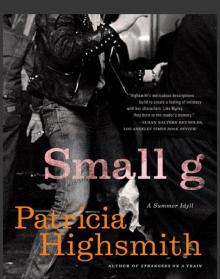 Small G: A Summer Idyll
Small G: A Summer Idyll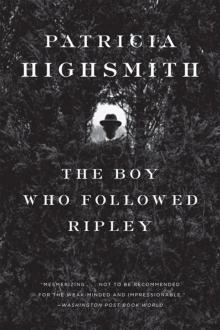 The Boy Who Followed Ripley
The Boy Who Followed Ripley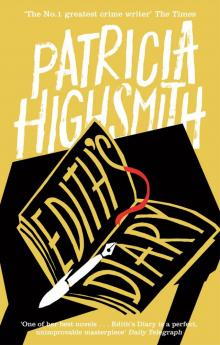 Edith's Diary
Edith's Diary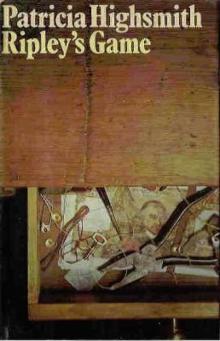 Ripley's Game
Ripley's Game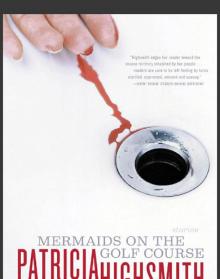 Mermaids on the Golf Course: Stories
Mermaids on the Golf Course: Stories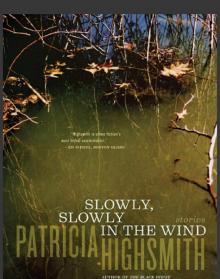 Slowly, Slowly in the Wind
Slowly, Slowly in the Wind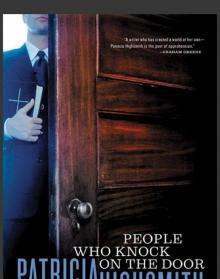 People Who Knock on the Door
People Who Knock on the Door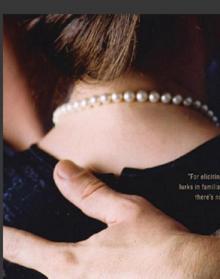 The Glass Cell
The Glass Cell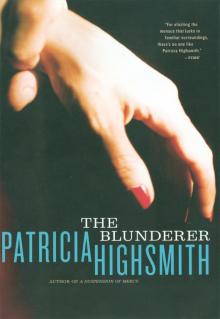 The Blunderer
The Blunderer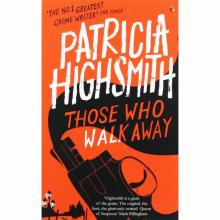 Those Who Walk Away
Those Who Walk Away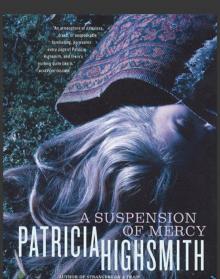 A Suspension of Mercy
A Suspension of Mercy Eleven
Eleven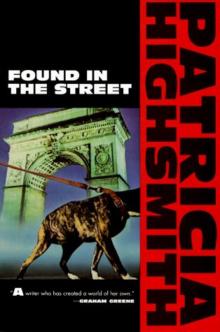 Found in the Street
Found in the Street Ripley Under Ground
Ripley Under Ground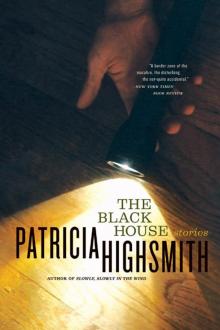 The Black House
The Black House The Cry of the Owl
The Cry of the Owl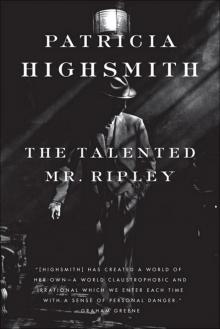 The Talented Mr. Ripley
The Talented Mr. Ripley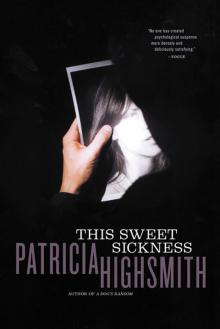 This Sweet Sickness
This Sweet Sickness The Two Faces of January
The Two Faces of January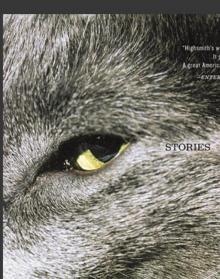 The Animal-Lover's Book of Beastly Murder
The Animal-Lover's Book of Beastly Murder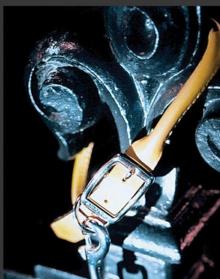 A Dog's Ransom
A Dog's Ransom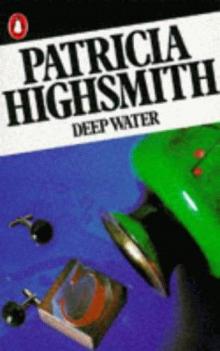 Deep Water
Deep Water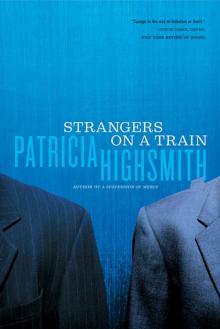 Strangers on a Train
Strangers on a Train Ripley Under Water
Ripley Under Water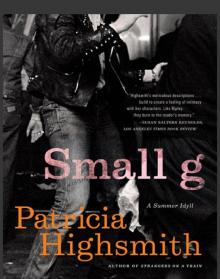 Small g
Small g Nothing That Meets the Eye
Nothing That Meets the Eye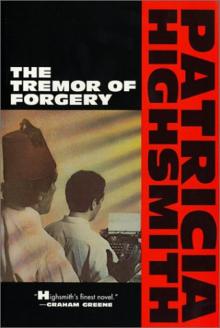 Patricia Highsmith - The Tremor of Forgery
Patricia Highsmith - The Tremor of Forgery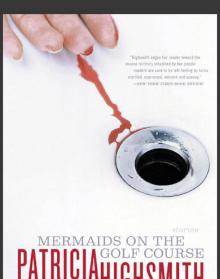 Mermaids on the Golf Course
Mermaids on the Golf Course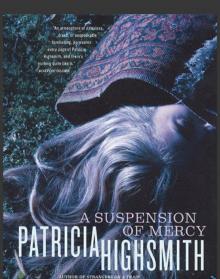 Suspension of Mercy
Suspension of Mercy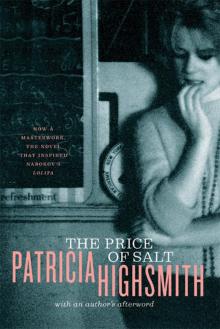 The Price of Salt, or Carol
The Price of Salt, or Carol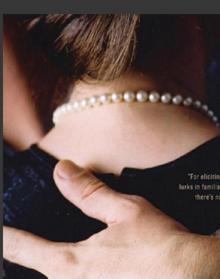 Glass Cell
Glass Cell